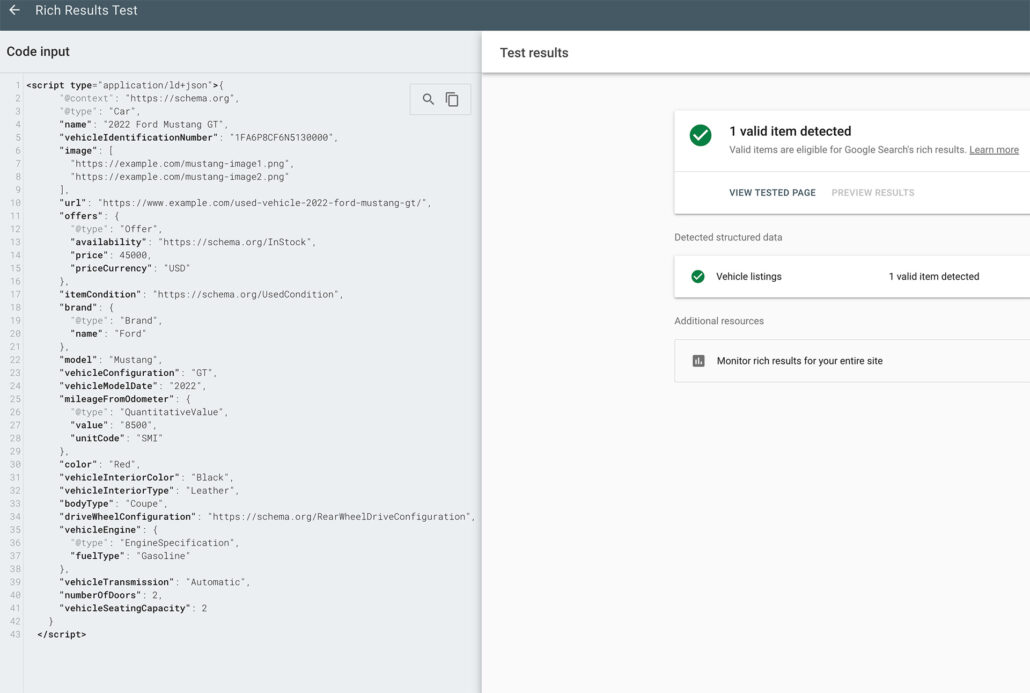Vehicle listing (Car) structured data is a new way for car dealerships to make their for-sale inventory eligible for display on various Google surfaces, including Google Search and dealerships’ Business Profiles. It was released by Google on October 17, 2023, and is currently only available in the US and US territories.
Benefits of using vehicle listing (Car) structured data
There are several benefits to using vehicle listing (Car) structured data, including:
- Increased visibility and exposure: Car dealerships that implement vehicle listing structured data will be eligible for the Vehicle Listing rich result. This rich result will be displayed in Google Search results when users search for vehicles for sale nearby. It will include key information about the vehicle, such as the make, model, year, price, and mileage.
- Improved customer experience: The Vehicle Listing rich result makes it easy for potential customers to learn more about the vehicles you have for sale. They can view photos, compare prices, and even contact you directly from the search results.
- Increased sales: By increasing your visibility and exposure, and by making it easier for potential customers to learn more about your vehicles, you can potentially increase your sales.

Unlocking the Potential of Vehicle Listing Rich Results
In contrast to the typical dependency on structured data for most rich results, the Vehicle Listing rich result can be attained using two distinct methods.
- Through structured data markup on your website. This is the main focus of this article. To implement vehicle listing structured data using markup, you will need to add a few lines of code to your vehicle listing pages.
- Through feed files uploaded to the vehicle listings partner portal. This method is more complex, but it may be a better option for car dealerships with large inventories.
Requirements for vehicle listing (Car) structured data
In order to be eligible for the Vehicle Listing rich result, your vehicle listing pages must meet the following requirements:
- Your vehicle listing pages must be publicly accessible.
- Your vehicle listing pages must contain all of the required structured data fields.
- Your vehicle listing pages must be accurate and up-to-date.
How to implement vehicle listing (Car) structured data
Required structured data fields for vehicle listing (Car)
The following structured data fields are required for vehicle listing (Car):
- brand – provide the make of the vehicle.
- brand.name – this field must contain the name of the vehicle, e.g. BMW
- item condition – to define whether the vehicle is new or second-hand use one of the following values: https://schema.org/NewCondition or https://schema.org/UsedCondition
- mileageFromOdometer – provide the total distance recorded on the odometer of the specific vehicle since it was first manufactured.
- mileageFromOdometer.unitCode – provide the units used for measuring the total distance using the UN/CEFACT Common Code. For miles use SMI and for kilometres use KMT.
- mileageFromOdometer.value – the numeric distance value indicated by the odometer reading.
- model – provide the model of the car, e.g. M3.
- offers – the offer details of the advertised vehicle. Use this one with offers.availability, offers.price and offers.priceCurrency.
- offers. availability – information about whether the vehicle is in stock or not. Use https://schema.org/InStock if the vehicle is in stock and https://schema.org/OutOfStock if the vehicle is currently out of stock.
- offers. price – provide the price of the vehicle that is applicable to all customers (with all discounts included).
- offers.priceCurrency – provide the price currency in the ISO 4217 three-letter format.
- vehicle identification number – provide the Vehicle Identification Number (VIN). The VIN must be valid according to the NHTSA standard.
- vehicleModelDate – provide the vehicle model year in the YYYY format, e.g. 2008
Optional structured data fields for vehicle listing (Car)
The following structured data fields are optional for vehicle listing (Car), but they are recommended:
- bodyType – provide the body style of the vehicle, e.g. SUV, hatchback, saloon etc. As of today, Google only supports ‘bodyType’ values in English.
- color – this field should contain the exterior colour of the vehicle.
- image – this field must contain a URL to a photo of the vehicle.
- name – supply the vehicle name as it appears on the website, e.g. ‘Used BMW i5 M Sport Auto eDrive 4dr (11kW Charger)’.
- numberOfDoors – provide the vehicle number of doors.
- url – his field must contain a URL to the vehicle listing page.
- vehicleConfiguration – indicate the configuration of the vehicle, e.g. L, SE, RS etc.
- vehicleEngine – provide the vehicle’s engine specification.
- vehicleEngine.fuelType – this field should contain the fuel type of the vehicle, such as “gasoline” or “electric”.
- vehicleInteriorColor – this field should contain the interior colour of the vehicle.
- vehicleInteriorType – provide the interior type or material of the vehicle, e.g. the interior type or material of the vehicle, e.g. faux leather, fabric, faux etc.
- vehicleSeatingCapacity – specify the number of seats.
- vehicleTransmission – describe the transmission of the vehicle, e.g. manual, automatic, direct-shift gearbox etc.
- driveWheelConfiguration – provide the vehicle driveWheelConfiguration.*
*To define the driveWheelConfiguration use the following 4 options:
- https://schema.org/AllWheelDriveConfiguration
- https://schema.org/FourWheelDriveConfiguration
- https://schema.org/FrontWheelDriveConfiguration
- https://schema.org/RearWheelDriveConfiguration
Vehicle listing (Car) structured data Example
<script type="application/ld+json">
{
"@context": "https://schema.org",
"@type": "Car",
"name": "2022 Ford Mustang GT",
"vehicleIdentificationNumber": "1FA6P8CF6N5130000",
"image": [
"https://example.com/mustang-image1.png",
"https://example.com/mustang-image2.png"
],
"url": "https://www.example.com/used-vehicle-2022-ford-mustang-gt/",
"offers": {
"@type": "Offer",
"availability": "https://schema.org/InStock",
"price": 45000,
"priceCurrency": "USD"
},
"itemCondition": "https://schema.org/UsedCondition",
"brand": {
"@type": "Brand",
"name": "Ford"
},
"model": "Mustang",
"vehicleConfiguration": "GT",
"vehicleModelDate": "2022",
"mileageFromOdometer": {
"@type": "QuantitativeValue",
"value": "8500",
"unitCode": "SMI"
},
"color": "Red",
"vehicleInteriorColor": "Black",
"vehicleInteriorType": "Leather",
"bodyType": "Coupe",
"driveWheelConfiguration": "https://schema.org/RearWheelDriveConfiguration",
"vehicleEngine": {
"@type": "EngineSpecification",
"fuelType": "Gasoline"
},
"vehicleTransmission": "Automatic",
"numberOfDoors": 2,
"vehicleSeatingCapacity": 2
}
</script>How to test your vehicle listing (Car) structured data
Once you have implemented vehicle listing structured data on your website, you can use the Google’s Structured Data Testing Tool to test it. This tool will show you any errors or warnings in your markup.

How to monitor your vehicle listing (Car) structured data
You can use Google Search Console to monitor your vehicle listing structured data. The Structured Data report will show you how many pages on your website have valid vehicle listing structured data, and any errors or warnings.
FAQ structured data
Structured data, also known as schema markup, is a standardized format used to provide search engines with additional context about the content on a web page. It helps search engines understand the content better, which can lead to enhanced search engine results and improved SEO. Structured data can be used to mark up various types of content, such as events, products, recipes, and more.
To check if your structured data is implemented correctly, you can use Google’s Structured Data Testing Tool (formerly known as the Structured Data Markup Helper). Simply enter your website URL or the HTML code of the specific page you want to test, and the tool will provide feedback on any errors or warnings related to your structured data markup.
Common issues that can lead to structured data errors include missing or incomplete markup, incorrect data types, mismatched property values, and outdated schema.org vocabulary. It’s crucial to ensure that your structured data accurately represents the content on your page and follows schema.org guidelines.
To fix structured data errors, you should review the feedback provided by tools like Google’s Structured Data Testing Tool to identify specific issues. Once identified, make the necessary corrections in your website’s HTML code to address these errors. After making changes, retest the structured data to confirm that the issues have been resolved.
Yes, structured data can affect how your content appears in search results. When search engines like Google understand your content through structured data, they may display rich results, such as featured snippets, knowledge panels, or carousel listings. These enhanced search results can make your content more visible and engaging to users, potentially increasing click-through rates and traffic to your website.
Remember that structured data is a valuable tool for SEO, and debugging any issues in its implementation can help improve your website’s visibility in search engine results.


Leave a Reply